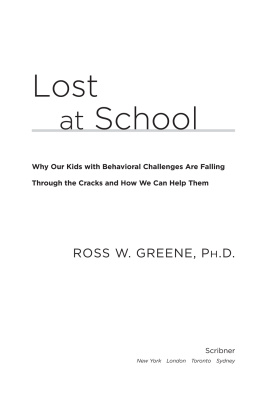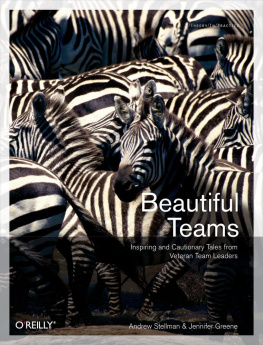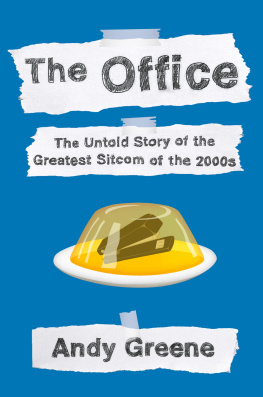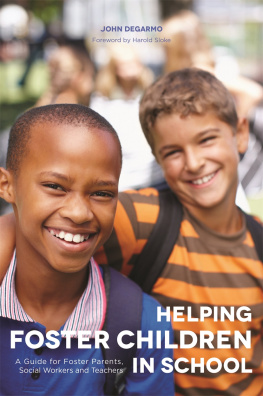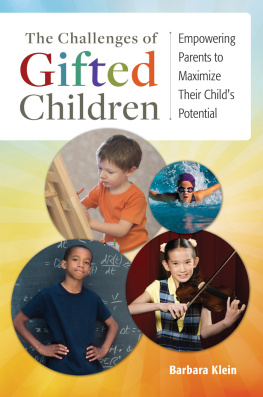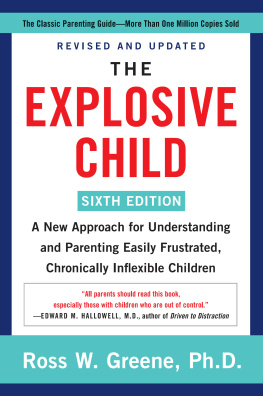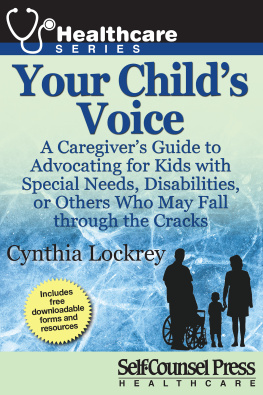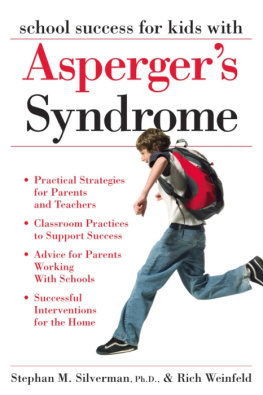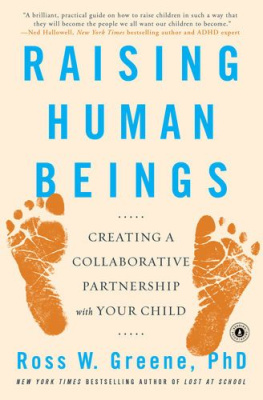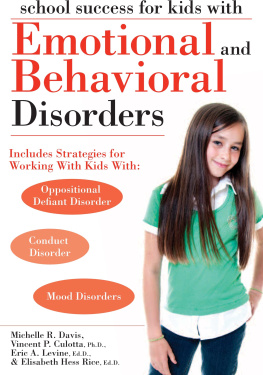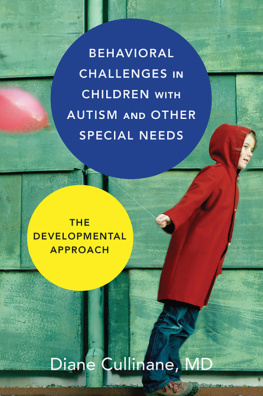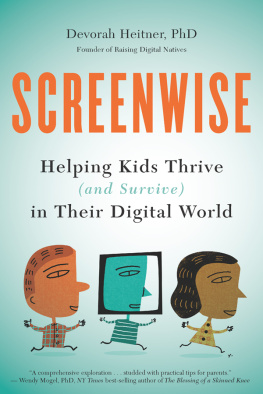Praise for Lost at School
No one in America has thought more deeply about the problems of disruptive children in school than Ross Greene. In his brilliant new book, he goes inside the minds of children and school personnel to explain why old-fashioned school discipline and zero-tolerance policies have failed. Then he offers original and tested new strategies for working with the most behaviorally challenging children. Every teacher and administrator who has ever felt that traditional discipline isnt working should read Lost at School .
Dr. Michael Thompson, school consultant, coauthor of Raising Cain, and author of Best Friends, Worst Enemies
We cannot ignore difficult student behaviors any longer. Dr. Greenes book is a timely contribution to the literature on how schools must support all students, and his approach fits well with Response to Intervention (RTI).
Rachel Brown-Chidsey, Ph.D., NCSP, associate professor, School Psychology Program, University of Southern Maine, and coauthor of Response to Intervention
A positive and practical approach for teachers who want to work redemptively with kids whose classroom behavior is an impediment to academic and social success.
Carol Ann Tomlinson, Ed.D., Curry School of Education, University of Virginia
Accessible advice for parents and teachers concerned about children with behavior problems.
Booklist
I hope that someday we will learn the terrible cost we all pay when we ignore or mismanage those people in society who most need our help.
THE HON. JUDGE SANDRA HAMILTON, PROVINCIAL COURT OF ALBERTA, CANADA
The finest hour I have seen
Is the one that comes between
The edge of night and the break of day
Its when the darkness rolls away.
KATE WOLF (SONGWRITER), FROM ACROSS THE GREAT DIVIDE
Thank you for purchasing this Scribner eBook.
Sign up for our newsletter and receive special offers, access to bonus content, and info on the latest new releases and other great eBooks from Scribner and Simon & Schuster.

or visit us online to sign up at
eBookNews.SimonandSchuster.com


SCRIBNER
A Division of Simon & Schuster, Inc.
1230 Avenue of the Americas
www.SimonandSchuster.com
New York, NY 10020
Copyright 2008 by Ross W. Greene
All rights reserved, including the right to reproduce this book or portions thereof in any form whatsoever. For information address Scribner Subsidiary Rights Department, 1230 Avenue of the Americas, New York, NY 10020.
First Scribner trade paperback edition October 2009
SCRIBNER and design are registered trademarks of The Gale Group, Inc., used under license by Simon & Schuster, Inc., the publisher of this work.
Designed by Kyoko Watanabe
Text set in Sabon
Library of Congress Control Number: 2008012479
ISBN 978-1-4165-7226-8
ISBN 978-1-4165-7227-5 (pbk)
ISBN 978-1-4165-8367-7 (ebook)
Excerpt from Across the Great Divide by Kate Wolf copyright Another Sundown Publishing Company, used with permission.
Many people have teachers they remember fondly as the ones who believed in them and helped them reach their fullest potential. This book is dedicated to Marshall Stearns, my sixth-grade teacher at North Miami Elementary School in 1968.
Contents
The wasted human potential is tragic. In so many schools, kids with social, emotional, and behavioral challenges are still poorly understood and treated in a way that is completely at odds with what is now known about how they came to be challenging in the first place. The frustration and desperation felt by teachers and parents is palpable. Many teachers continue to experience enormous stress related to classroom behavior problems and from dealing with parents, and do not receive the support they need to help their challenging students. Half of teachers leave the profession within their first four years, and kids with behavioral challenges and their parents are cited as one of the major reasons. Parents know theres trouble at school, know theyre being blamed, feel their kids are being misunderstood and mistreated, but feel powerless to make things better and are discouraged and put off by their interactions with school personnel.
School discipline is broken. Not surprisingly, tightening the vise grip hasnt worked. A task force of the American Psychological Association has recently concluded that zero-tolerance policies, which were intended to reduce violence and behavior problems in our schools, have instead achieved the opposite effect. A review of ten years of research found that these policies have not only failed to make schools safe or more effective in handling student behavior, but have actually increased behavior problems and dropout rates.
Behind the statistics, behind each expulsion, suspension, and detention, are human beingskids, teachers, parentsdoing the best they can with the tools they have. Dramatic changes are needed to help them. And my experience suggests that these changes wont be as painful and difficult as many fear. We cannot keep doing things the way we always have and continue losing kids on a scale that is truly astounding. This book is about doing things a different way.
I interact with hundreds of challenging kids every year. These kids would like nothing better than to be able to handle the social, emotional, and behavioral challenges being placed on them at school and in life, but they cant seem to pull it off. Many have been getting into trouble for so long that theyve lost faith that any adult will ever know how to help them.
I work with hundreds of teachers every year, too. The vast majority care deeply about kids and devote massive amounts of time and energy to the kids they teach. But most readily acknowledge that understanding and helping challenging kids wasnt a major part of their education, and that they could use some serious help with some of these students and their parents. And most are so caught up in the daily demands of teaching and all the new initiatives imposed on them that they simply dont have time to reflect on how to better help the challenging kids in their classrooms.
I also work with hundreds of parents of challenging kids every year. Most are eager to work with school personnel in addressing their kids challenges in an effective and compassionate way, but they arent exactly sure how to make it happen.
Ten years ago I published a book called The Explosive Child that was primarily geared toward parents. Since then, the model I described in The Explosive Child called Collaborative Problem Solving (CPS)has been implemented not only in thousands of households but also in dozens of inpatient psychiatric units, residential facilities, systems of juvenile detention, and general and special education schools. Its become clear that a book delineating how the CPS model is applied in schools is sorely needed.
Now you know why I wrote this book and for whom I wrote it. So lets talk a little about the how.
Helping kids with social, emotional, and behavioral challenges is not a mechanical exercise. Kids arent robots, adults arent robots, and helping them work together isnt robotic. The work is hard, messy, uncomfortable, and requires teamwork, patience, and tenacity, especially as the work also involves questioning conventional wisdom and practices. This book contains lots of material and examples to help you better understand challenging kids, how to implement the CPS model, and how to work collaboratively toward the common goal of helping these kids more effectively.
Next page
